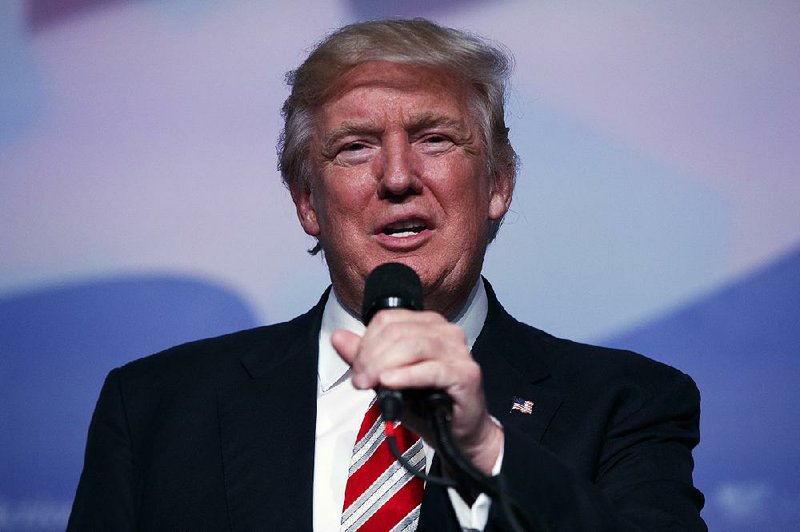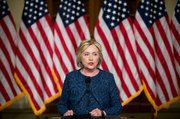NEW YORK -- Hillary Clinton said Friday that it was time for a "rethinking" of the U.S. strategy for North Korea. Donald Trump, meanwhile, suggested that outlining national security policies could help the nation's enemies.
RELATED ARTICLES
http://www.arkansas…">Nuke test earns rebukes, calls to punish N. Korea http://www.arkansas…">Democrat: Panel chief in GOP mire over Clinton
FULL ELECTION COVERAGE
"Maybe we shouldn't be so honest when it comes to military strategy," Trump said in an afternoon speech to conservative activists in Washington, a day after outlining his plan to budget $20 billion to let children attend any schools their families choose.
Trump did, however, vow to deploy military muscle to attack America's enemies if provoked. He said at a rally Friday night in Pensacola, Fla., that if he is elected president, ships trying to provoke the U.S. "will be shot out of the water."
In New York, Clinton said she would seek to impose tougher sanctions on North Korea. She also argued that the latest bomb test provides an opening to pressure China, which has been tepid in its response to the communist nation's nuclear ambitions.
"I think we have an opening here that we haven't had for the last several years that I intend to do everything I can to take advantage of," the former secretary of state said.
Clinton spoke hours after Trump campaign manager Kellyanne Conway, pressed on Trump's plans for the region, said only, "He wouldn't do what's being done now."
"He's not going to reveal all of his plans, and he's made that very clear. And maybe someone can ask him in a debate," Conway told CBS This Morning. "But the fact is that this entire world would be put on notice that there's a strong leader in the White House."
Trump focused on attacking Clinton's credibility. He said Clinton was being "protected" during the Justice Department's investigation into her use of a private email server while secretary of state.
"She could walk right into this arena right now and shoot somebody with 20,000 people watching, right smack in the middle of the heart, and she wouldn't be prosecuted," Trump said.
He also talked up his education agenda -- including expanding home-schooling rights -- and repeated a line he recently introduced into his stump speech as an appeal to black and Hispanic voters: "What do you have to lose?"
school-choice proposal
Trump's education discussion followed his visit Thursday to a Cleveland inner-city charter school where he offered his most detailed education proposal to date.
"As president, I will establish the national goal of providing school choice to every American child living in poverty," Trump said to the largely black audience at Cleveland Arts and Social Sciences Academy, a charter school with about 350 students in kindergarten through eighth grade. "If we can put a man on the moon, dig out the Panama Canal and win two world wars, then I have no doubt that we as a nation can provide school choice to every disadvantaged child in America."
About a dozen students, teachers, administrators of the school participated in the discussion before Trump's speech. He talked about his desire to increase the number of charter schools and other school-choice options because "the traditional way, it's not working so well."
Trump said the $20 billion in grants for students from low-income families would come from existing federal spending. Rather than sending federal education dollars to schools, as the existing system does, Trump proposed giving block grants to states, which would have the option of letting the dollars follow students to whichever school they choose, including a charter, private or online school.
Funding schools this way, known in education circles as portability, is popular as a way to broaden school choice. More choice, some believe, introduces competition to the marketplace of schools and raises student learning.
Critics fear that portability, which Congress rejected in its latest overhaul of the nation's chief education law last year, will bleed dollars from traditional public schools. Critics also oppose channeling taxpayer money to private religious schools and schools run for profit -- like the charter Trump visited.
"Distribution of this grant will favor states that have private school choice and charter laws," he said.
Trump also said he would support merit pay for teachers and use the bully pulpit afforded by the presidency to advocate for candidates who run on making "school choice" more widespread.
"There is no failed policy more in need of urgent change than our government-run education monopoly," Trump said. He said he was "proposing a plan to provide school choice to every disadvantaged student in America."
Trump did not explain where in the federal budget he would find the $20 billion. His campaign said the money would come from "reprioritizing existing federal dollars."
His campaign reportedly drafted his proposal with the advice of an aide to U.S. Rep. Luke Messer, R-Ind., of the House Education Committee.
Not everyone was persuaded by Trump's visit to Cleveland. In an email before he spoke, Melissa Cropper, president of the Ohio Federation of Teachers, criticized Trump's decision to visit a for-profit charter school.
"In Ohio, we've seen more than enough of the 'solutions' Donald Trump is selling, but we're not buying," Cropper said, in the statement. "Unregulated, unaccountable for-profit charter schools -- like the one Trump is visiting today -- have destabilized our public districts, defrauded taxpayers and left our kids and educators worse off, not better."
Polls show Clinton is leading among black voters and other minority groups, but Trump disputed that.
"You're going to like the job I do, folks, I'm going to do such a great job," Trump said. "You give me the chance -- I'll get all your votes in four years. Everybody's going to be voting for me, by the way: African-Americans, Hispanic-Americans, just everybody."
'plenty' of faults
Clinton on Friday portrayed her rival as a nihilist who doesn't understand blacks or their faith.
The next president, she told the audience at the National Baptist Convention in Kansas City, Mo., on Thursday night, should be "a praying person."
"Our greatest leaders are often the most humble because they recognize both the awesome responsibilities of power and the frailty of human action," Clinton told an audience made up mostly of blacks. The nation, she added, needed "a president who will pray with you and for you."
Clinton said she was "grateful for the great gift of personal salvation and for the great obligation of the social gospel."
And, as she faces continued criticism over her handling of emails at the State Department, Clinton conceded she had "plenty" of faults and had made mistakes. "I don't know anyone who hasn't," she said.
"Everyone here today has stumbled on their own stony roads," she said. "It's grace that lifts us up, grace that leads us home."
Elsewhere Thursday night, Trump appeared on RT America, a Russia-backed television channel. Clinton on Friday said she was "disappointed" by Trump's decision, saying that "every day that goes by this just becomes more and more of a reality television show. It's not a serious presidential campaign."
But Trump's running mate countered that image with his first intelligence briefing Friday. Indiana Gov. Mike Pence said he was "grateful" for the "thorough and informative" briefing, but the vice presidential nominee declined to offer any specifics, since the information was classified.
Pence also released a decade's worth of tax returns Friday. The campaign said Pence paid a state and federal tax rate that ranged between 10 percent and 16 percent over the past decade.
His income topped out at $187,000 while he was still a member of Congress, but dropped to $113,000 last year.
Pence, Clinton and her running mate, Sen. Tim Kaine of Virginia, have all released their tax returns. Trump has not, saying he is waiting for the conclusion of an audit.
Barbra Streisand joked about the wait for Trump's returns during one of two Clinton fundraisers Friday in New York.
The singer performed a parody of the Stephen Sondheim song "Send in the Clowns" with lyrics about the Republican nominee: "Is he that rich, maybe he's poor, till he reveals his returns, who can be sure?"
Streisand continued: "And if by chance he gets to heaven, even up there, he'll declare Chapter 11. This sad, vulgar clown. You're fired, you clown."
At the same fundraiser, Clinton said "half" of Trump's supporters could be grouped in "the basket of deplorables."
"The racist, sexist, homophobic, xenophobic, Islamophobic -- you name it," Clinton said. "And unfortunately there are people like that. And he has lifted them up."
But she called for empathy for the "other half" of Trump's supporters.
"That other basket of people are people who feel that the government has let them down, the economy has let them down, nobody cares about them, nobody worries about what happens to their lives and their futures, and they're just desperate for change," Clinton said.
In addition to Friday night's fundraisers, Clinton got help from billionaire Facebook co-founder Dustin Moskovitz, who said Friday that he's giving $20 million to help defeat Trump.
Clinton's campaign also said the number of retired generals and admirals endorsing her for president has grown to 110. Trump countered by saying his list had grown to 120 former U.S. generals and admirals.
The promotion of endorsements came as early voting began in North Carolina, the first of 37 states that will allow balloting by mail for any reason or in person before Election Day on Nov. 8.
The Clinton campaign said Friday that it was planning events this month aimed at boosting turnout, including a nationwide "weekend of action" on Sept. 17 and 18 focused on voter registration and mobilization. Clinton hosted a call with campus organizers and supporters Thursday to help mobilize efforts.
The Trump campaign, working with the Republican National Committee to boost absentee mail balloting in Florida, North Carolina, Ohio and Iowa, described its early efforts as key to a "path to victory."
"We must reach every voter before early voting and Election Day," campaign manager Conway wrote in a memo Monday.
Information for this article was contributed by Steve Peoples, Catherine Lucey, Hope Yen, Gary Robertson and Julie Bykowicz of The Associated Press; by Sahil Kapur of Bloomberg News; by Abby Phillip, Sean Sullivan and Emma Brown of The Washington Post; and by Amy Chozick, Ashley Parker and Trip Gabriel of The New York Times.
A Section on 09/10/2016

